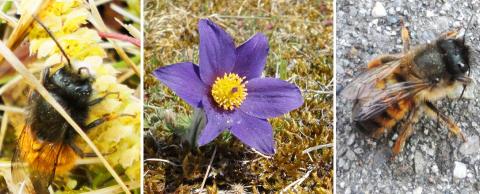Seed production will likely find a different route, this is two bee species out of about 25,000 after all, and the bee will switch to other plants to forage on.
None of that is devastating unless it doesn't happen the way evolution has happened so far.
The scientists were interested in how different temperatures in winter and spring affect the hatching time of the European orchard bee (Osmia cornuta) and of the red mason bee (Osmia bicornis) as well as the onset of flowering in the pasque flower, Pulsatilla vulgaris, one of the earliest flowering plants. There is concern among some that evolution is not predictive, so species may just die out if warming continues.

Bee cocoons were placed on eleven grassland sites in the Würzburg area. On seven grasslands, they additionally studied the effect of temperature on the onset of flowering in the pasque flower. Because the surface temperatures of the respective grasslands were different, they were able to investigate the impact of higher temperatures as an effect of climate change on the onset of flowering in Pulsatilla vulgaris and on the hatching of the mason bees.
The result was clear: As the temperatures increased, the pasque flower started to flower earlier. The emergence of the two solitary bee species lagged somewhat behind. This poses the risk that the first flowers of the pasque flower bloom in the absence of suitable pollinators. As a result, reduced viability and reproductive success could negatively affect the population size and even push a species to extinction in the long run. Climate change thus presents another risk for the native red-list species Pulsatilla vulgaris. However, this temporal mismatch can also endanger the solitary bees due to the reduced availability of nectar and pollen.






Comments